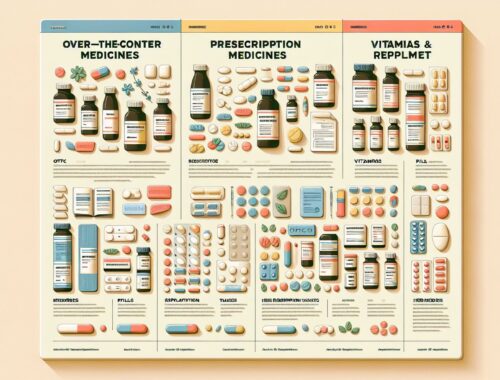
Exploring the Different Types of Medicines
When it comes to treating illnesses and ailments, different types of medicines are available to cater to various needs. From over-the-counter drugs to prescription medications, each type serves a specific purpose in helping individuals manage and improve their health. Let’s delve into the world of medicines and explore the different categories that exist.
Over-the-Counter (OTC) Medications
Over-the-counter medications are readily available without the need for a prescription. These drugs are typically used to provide relief from common symptoms such as pain, cough, cold, allergies, and indigestion. Examples of OTC medications include acetaminophen, ibuprofen, antihistamines, and cough syrups. While OTC drugs can be effective for mild symptoms, it’s essential to follow the recommended dosage and consult a healthcare professional if symptoms persist.
Prescription Medications
Prescription medications are drugs that require a prescription from a healthcare provider or physician. These medications are typically used to treat more complex or severe conditions such as high blood pressure, diabetes, infections, and mental health disorders. Prescription drugs are tailored to the individual’s specific needs and medical history, and their usage should be closely monitored by a healthcare professional to ensure safe and effective treatment.
Herbal and Dietary Supplements
Herbal and dietary supplements are natural products that are used to support overall health and well-being. These supplements can come in various forms such as vitamins, minerals, herbs, and probiotics. While herbal and dietary supplements can complement a healthy lifestyle and fill nutrient gaps, it’s essential to consult a healthcare provider before incorporating them into your routine, as they may interact with prescription medications or have adverse effects in some individuals.
Vaccines
Vaccines are biological preparations that help prevent infectious diseases by stimulating the body’s immune system to produce antibodies. Vaccines are crucial in preventing the spread of diseases such as measles, influenza, polio, and COVID-19. By receiving vaccinations, individuals not only protect themselves but also contribute to herd immunity, reducing the overall spread of infectious diseases in the community.
Specialty Medications
Specialty medications are drugs that are used to treat complex and chronic conditions such as cancer, autoimmune diseases, and genetic disorders. These medications often require special handling and administration, as well as close monitoring by healthcare providers to ensure optimal treatment outcomes. Specialty medications may be biologics, gene therapies, or orphan drugs that target specific disease pathways or genetic mutations.
In conclusion, the world of medicines is vast and diverse, with various types of drugs available to address different health needs. Whether it’s over-the-counter medications for minor ailments, prescription drugs for chronic conditions, herbal supplements for overall well-being, vaccines for disease prevention, or specialty medications for complex diseases, each type plays a vital role in improving and maintaining health. By understanding the different categories of medicines and their respective uses, individuals can make informed decisions about their healthcare and work towards achieving optimal well-being.
You May Also Like

Understanding the Different Types of Medicines
January 16, 2024
Exploring the Various Types of Medicines
April 12, 2024

